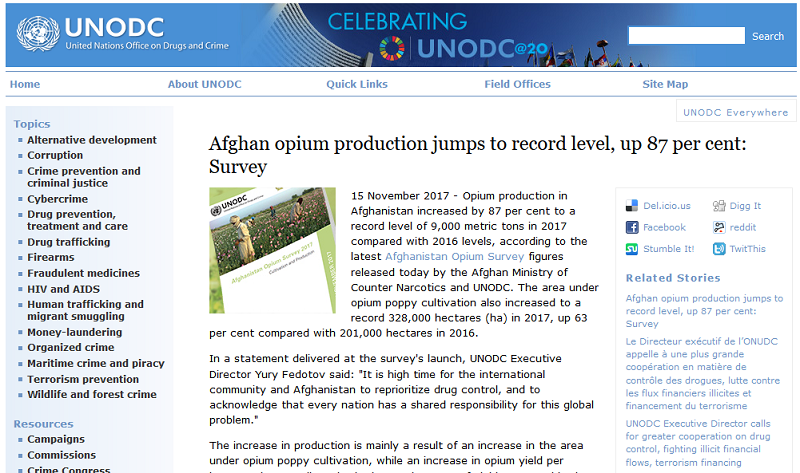Islamabad, Pakistan: Poppy cultivation and opium production in Afghanistan has recorded 87% increase this year comparing to previous year’s production, indicates latest UNODC Survey Report.
According to annual report of the United Nations Office on Drugs and Crime (UNODC), 87 per cent rise in opium cultivation and production has been recorded in Afghanistan. The rise is due to massive increase in poppy growing areas in Afghanistan because the writ of US and Afghan forces is now limited to certain urban areas while ruler areas have virtually under the control of Taliban who are growing and producer drugs to meet their cash requirement for funding their fight against Afghan and US forces. UNODC Survey Report indicates that the area under opium poppy cultivation has increased to a record 328,000 hectares in 2017 comparing to 201,000 hectares of 2016.

UNODC report says:
“According to the latest figures released by the Afghan Ministry of Counter Narcotics and UNODC, in addition to an 87 per cent jump to a record level of 9,000 metric tonnes in 2017, the area under opium poppy cultivation also increased to a record 328,000 hectares in 2017, up 63 per cent compared with 201,000 hectares in 2016. For both Afghanistan, and the world, we are heading towards uncharted territory. Additionally, the number of poppy-free provinces in the country decreased from 13 to 10 – and after more than a decade, Ghazni, Samangan and Nuristan lost their poppy-free status. The number of provinces affected by cultivation increased accordingly from 21 to 24. These frightening figures should give considerable pause for reflection on whether the calculus on the illicit drugs flowing from Afghanistan adds up to a workable and achievable solution,” he continued, again urging the international community to revisit its engagement with Afghanistan, and to acknowledge that fresh assessments and policy revisions may be necessary”.
UNODC Afghanistan Opium Survey Report can be downloaded to click this link
